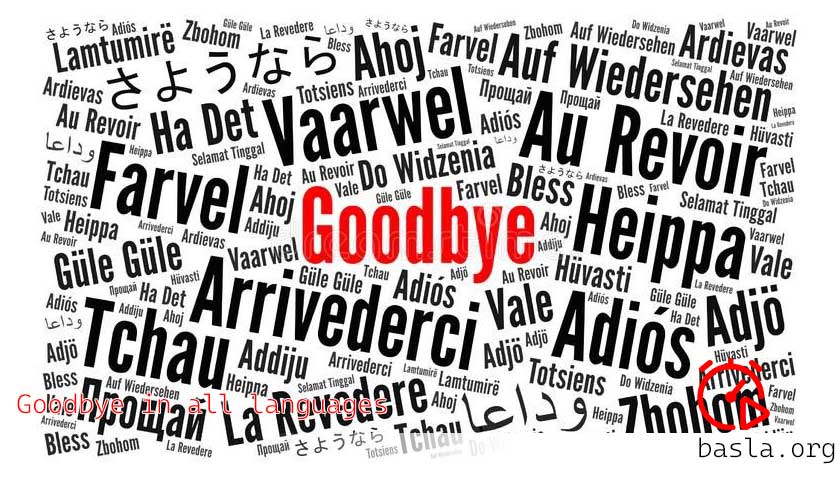How to Say “Goodbye” in the World’s Most Spoken Languages
Want to learn how to say goodbye in different languages? If so then you’ve come to the right place!
The word goodbye originates from the term “Godbwye” a contraction of the phrase “God be with ye.” This conveys a prayer, a blessing, or hope that the person upon whom it is bestowed will travel safely. Over time, it is believed the phrase, influenced by other related terms, transitioned from “god be with ye” to god-b’wye to good-b’wy, and eventually ending in today’s blessing of goodbye.
Why do we say goodbye? : Life happens. People move away. Goodbye, which started out as a form of blessing, is now used as a polite way to take one’s leave or to express emotion on parting ways. Despite the difference in etymologies, terms of goodbye are similarly conveyed across different cultures and languages.
As with English, there are many different ways to express your “farewell”. “Goodbye”, “bye”, “see you soon”, “talk to you later”, to name just a few. With almost 200 countries, and thousands of languages spoken between them, it would be quite a feat to learn them all. However, by looking at a handful of them, you might already recognize the most common “goodbye” in a few languages.
We have brought together the most beautiful “Goodbye” translations that will translate your feelings for you as basla.org . You can share your favorites from the following messages on social media accounts.
All around the world people greet each other in different ways. In China they say “Ni hao,” in the Philippines “Kamusta,” and in Jordan “Marhaba.” Help your child learn how to say hello and goodbye in different languages. It’s a fun way to jumpstart conversations about different cultures.
? Arabic: مع السلامة (ma’assalama)
? Bengali/Bangla: বিদায় (biday)
? Cantonese: 再見 (zài jiàn)
? Danish: farvel
? Dutch: daag
? Farsi: خداحافظ (khodāhāfez)
? Filipino: paalam
? French: au revoir
? German: auf wiedersehen
? Hindi: नमस्ते (namaste)
? Indonesian: selamat tinggal / jalan
? Italian: arrivederci
? Japanese: しつれいします (shitsurei shimasu)
? Korean: 안녕 (an-young)
? Malay: selamat tinggal / jalan
? Mandarin: 再见 (zàijiàn)
? Norwegian: ha det
? Polish: do widzenia
? Portuguese: adeus
? Punjabi: ਅਲਵਿਦਾ (alvida)
? Romanian: la revedere
? Russian: до свидания (do svidaniya)
? Spanish: adiós
? Swedish: hejdå
? Turkish: güle güle
? Ukranian: до побачення (do pobachennya)
? Urdu: خدا حافظ (khuda hafiz)
? Vietnamese: tạm biệt
Please find below many ways to say goodbye in different languages. This is the translation of the word “goodbye” to over 100 other languages.
? Afrikaans: Totsiens
? Arabic: وداعاً (wadaeaan)
? Albanian: Mirupafshim
? Amharic: ቻው (chaw)
? Aragonese: Adiós
? Armenian: Ցտեսություն (tstesutyun)
? Azerbaijani: Salamat qalın
? Basque: Agur / Aio (informal)
? Bavarian: auf wiedersehen
? Belarusian: да пабачэння (da pabačeńnya)
? Bengali: বিদায় (Biday)
? Breton: kenavo
? Bosnian: do viđenja (formal) / ćao (informal)
? Bulgarian: Довиждане (dovizhdane)
? Burmese: ႏႈတ္ ဆက္ ပါ တယ္ (note Sat Par Tal)
? Cantonese: 再見 (joi3 gin3)
? Chinese: 再见 (zài jiàn)
? Cebuano: ba-bay/baboosh
? Cherokee: Donadagohvi
? Corsican: Avvedeci
? Croatian: Doviđenja
? Czech: Na shledanou
? Danish: Farvel
? Dutch: Tot ziens
? English: Goodbye/bye (standard) take care, see you later, see you soon
? Estonian: Nägemist
? Finnish: Näkemiin
? French: Au revoir
? Georgian: ნახვამდის (nakhvamdis)
? German: Tschüss
? Greek: Αντίο (antio)
? Yasou: Γειά σου (informal) (YAH-soo)
? Gujarati: આવજો (aavjo)
? Haitian Creole: Orévwa
? Hausa: sai an jima
? Hawaiian: Aloha
? Hebrew: להתראות (le’hitraot)
? Hindi: अलविदा (alavida)
? Hungarian: Viszontlátásra (formal) / Viszlát (informal)
? Igbo: Ka ọ dị
? Icelandic: Vertu sæll
? Indonesian: Sampai jumpa / Sampai ketemu lagi (See you later)
? Irish: Slán
? Italian: Arrivederci
? Japanese: さようなら (sayounara)
? Javanese: pamit
? Kannada: ವಿದಾಯ (Vidāya)
? Kazakh: Cау болыңыз (saw bolıñız)
? Khmer: លា សិន ហើយ។ (Lea sen heuy)
? Korean: 잘 가요 (jal gayo)
? Kurdish: bi xatre te
? Latin: Vale (singular) / valete (plural)
? Lao: ລາກ່ອນ (la kon)
? Latvian: Uz redzēšanos
? Lithuanian: Iki
? Luxembourgish: äddi
? Macedonian: Довидување (doh-vee-DOO-vah-nyeh)
? Malagasy: Veloma
? Malay: Selamat tinggal (formal) / babai (informal) / jumpa lagi
? Malayalam: വിട (vita)
? Maltese: Addiju
? Maori: Poroporoaki
? Mandarin: 再见 (Zài jiàn)
? Marathi: गुडबाय (punha bhetu)
? Mikmaq: Nmultis
? Mongolian: Баяртай (bayartai)
? Nepali: बिदा भए है त। (bida bhaye hai ta)
? Norman: Boujou
? Norwegian: Hade (formal) / Ha det bra
? Odia: ସୁବିଦାୟ (shubidaaya)
? Persian / Farsi: خداحافظ (khodâhâfez)
? Polish: Do widzenia
? Portuguese: Adeus
? Punjabi: ਅਲਵਿਦਾ (alvida)
? Romani: Devlesa
? Romanian: La revedere
? Russian: До свидания (da svidània)
? Samoan: Tofa
? Serbian: Довиђења (Doviđenja) (formal) / Zdravo (casual)
? Scottish Gaelic: Beannachd leat (singular, familiar) / Beannacht leibh (plural, respectful)
? Slovak: Zbohom
? Slovenian: Zbogom
? Somali: Macsalaamo
? Spanish: Adiós
? Swahili: Kwaheri
? Swedish: Hejdå
? Tagalog / Filipino: Paalam
? Tahitian: Nānā
? Tamil: பிரியாவிடை (Piriyāviṭai)
? Thai: ลาก่อน (laa-gɔ̀ɔn)
? Telugu: సెలవు (selavu)
? Tswana: Go siame
? Turkish: Hoşçakalın, Güle güle
? Ukrainian: До побачення (do pobachennya) (formal) / Пока (poka) (informal)
? Urdu: خدا حافظ (kkhuda hafiz)
? Uzbek: Ko’rishguncha
? Vietnamese: Tạm biệt
? Welsh: Hwyl fawr (formal) / Hwyl (hoo-eel) (informal)
? Xhosa: Uhambe kakuhle
? Yiddish: זײַ געזונט (zay gezunt)
? Zulu: Hamba kahle






